Book One:
A SIMPLE ACT OF KINDNESS
|
CHAPTER
FIVE:
THE BALLANTYNE FAMILY
Written by
Rick Archer
©
2015, Richard Archer
|
 |
|
SUBCHAPTER 20
-
Maria
Ballantyne
|
Despite my perpetual loneliness, there was no other place
I would have rather been than at St. John's. I knew I was getting
an amazing education.
However, each year I
felt more like an outsider. So I adjusted as best I
could. If I couldn't participate, I could at least do a lot of watching.
The memory of the nasty woman who had practically taken my
head off with her scorn had a lingering effect. Although I didn't let that woman's
rude dismissal stop me from peeking in, I did become more
surreptitious.
I found an observation post in the
shadows behind an entrance to the room. If I got
an occasional dirty look from someone who noticed me, I learned
not to stick around. I would
simply disappear before they could say anything. No one ever
bothered me again.
There were usually
twenty or so women milling about. I
had no idea what their names were or who their children were.
Except one - Mrs. Ballantyne.
I first noticed Mrs.
Ballantyne in the 4th grade. I had no idea who she was, but
she definitely caught my attention. It seemed to me that
Mrs. Ballantyne dominated the conversation.
As Mrs. Ballantyne spoke, the other
women seemed to gather around her. I assumed she
was their leader. I didn't know if
Mrs. Ballantyne was as mean as that woman who had ordered me to leave,
but I did know I was impressed by her stature. Everything
seemed to revolve around her.
|
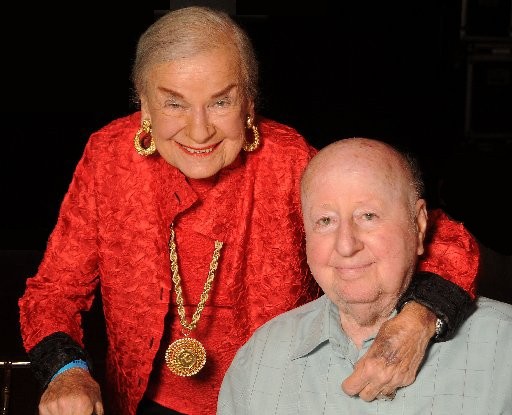
Mrs. Ballantyne pictured with her brother George
|
I found myself drawn to Mrs.
Ballantyne.
As I watched her
perform on center stage, I was
star-struck.
From that point on, whenever I noticed the
Mother's Guild in the Commons Room, the first thing I did was look
for this lady. Even if I had only a few minutes left to get to my next
class, I would risk being late just so I could watch Mrs.
Ballantyne
in action a little longer.
An attractive
woman about 5' 3" tall, Mrs. Ballantyne had dark brown hair
and a dark complexion thanks to her Greek heritage.
Whenever I saw her,
Mrs. Ballantyne always continued to be at the center of every group. Mrs.
Ballantyne was the most dynamic and powerful woman I had ever seen
in my life. I stopped paying attention to the other women and
began to concentrate only on her.
Any time I spotted
Mrs. Ballantyne, I would stop and hide somewhere
so I could study her for a few minutes. However, I never once came anywhere near
Mrs. Ballantyne. After that other lady had chewed me out so badly, I
kept a discrete distance from all these women lest they bite.
From the shadows, I was free to
study Mrs. Ballantyne. Over time I
thought I detected a difference between Mrs. Ballantyne and the
other women. For one thing, she seemed very down to earth. She
smiled a lot and radiated warmth. I began to like her.
I liked to watch her in action. As far as I was concerned, with
all those women buzzing around her,
Mrs. Ballantyne was
the Queen Bee.
It seemed to me that
Mrs. Ballantyne was most socially gifted person I had ever come
across. She exuded confidence. Warm and outgoing, Mrs.
Ballantyne struck me as the go-to lady at every one of these
afternoon Power Conclaves.
It struck me as
unusual that Mrs. Ballantyne was the only
"mother" I ever noticed. I didn't even know
her name, but I was mesmerized by her. I have not a single memory of
another mother who made an impression on me other than that particular woman who
had been
mean to me.
Oddly enough, it was not until the 7th grade
that I finally learned this lady's name. There was a new girl
in my class that year named Katina Ballantyne.
One morning I saw Katina get out of a car along with
several
brothers and sisters.
When a woman got out of the car to give instructions, I assumed that
was Katina's mother. By chance that afternoon I noticed this
same lady as she spoke to friends in the Mother's Guild group.
Now I began to pay more attention to Katina because I was so
fascinated by her mother.
Mrs. Ballantyne
seemed to be a constant fixture at my school.
I estimate I saw her at Saint John's two or three times a week for
all the nine years I attended. One day I asked Katina why her
mother was at school all the time. Katina told me her
family had seven children at the
school, more than any other family. I was incredulous
at that revelation. No wonder Mrs. Ballantyne was
at my school all the time.
Most of the time
I would spot Mrs. Ballantyne
in the Commons Room,
but she was also the only mother who ever seemed to appear in
other parts of the school.
I would see her striding down the hallway corridors
side by side with Headmaster Alan Chidsey or deep in
conversation with E.K. Salls, the Assistant Headmaster. Since I didn't see the other mothers doing the same thing,
this also set
Mrs. Ballantyne apart from the other women in
the Mother's Guild.
I had no idea why this
lady was so special, but Mrs. Ballantyne seemed to know everyone.
She was a social dynamo of the highest order.
Through the
grapevine, I learned Mrs. Ballantyne had a reputation at my school as an effective
go-getter. I have a hunch that for the most part
Mrs. Ballantyne used reason, charm and persuasion to accomplish most
of her projects.
However, Mrs. Ballantyne was
also rumored to have enormous will power.
It was said she could be very controlling at times, perhaps even
forceful. One day I inadvertently overheard
a conversation
about Mrs. Ballantyne's iron will. There had been a fierce argument
between Mrs. Ballantyne and one of her daughters (not
Katina) concerning a young man the girl was dating.
Mrs. Ballantyne didn't approve because in her opinion the young man was too
old for her daughter. The daughter, strong-willed just
like her mother, completely disagreed.
The ensuing battle led
to considerable thunder and lighting in the Ballantyne home. That
story convinced me I never wanted to cross swords with this
woman.
Based on this
story,
I suppose Mrs. Ballantyne
had a sledge hammer in her tool kit in addition to her assortment of persuasive
charms. No surprise there. I
am not quite sure how else one accomplishes things in life without
asserting one's will when necessary.
That is why some people
are called 'leaders'.
|
SUBCHAPTER 21
-
A Great Mom
|
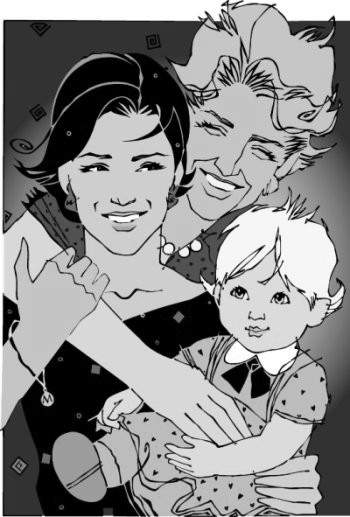 |
When
I recall my impression of Mrs. Ballantyne, I remember thinking
many times that she was the best mother I had ever seen.
From the moment I first spotted Mrs.
Ballantyne in the 4th grade, I was transfixed. The
4th grade became the 5th grade and the 5th grade became the
6th. With each
new grade, I resumed my silent watch and with each new grade my respect
for this woman deepened.
Over time I came to
greatly admire
Mrs. Ballantyne. Not only was she the clear leader of the Mother's
Guild, the alpha lady in a group
of women who were typically used to being in charge themselves, I also noticed how
well she interacted with her own children.
Mrs. Ballantyne obviously had her children's complete respect. I came to the conclusion that Mrs.
Ballantyne was not only the most socially talented woman I had ever seen,
she was also the best mother.
One day it finally
dawned on me why I
watched this lady every chance I got... Mrs. Ballantyne
represented the kind of mother I wished I could have.
My own mother was all I
had. Given that my father abandoned me shortly after the
divorce in 1959, thanks to the absence of relatives, family friends, or
even some kindly
neighborhood lady across the street, I was totally dependent on a
mother who was perpetually lost in her own problems.
Based on what I saw at
school, Mrs. Ballantyne seemed intimately involved
in every detail of her children's lives. As an extremely lonely
little boy, it isn't surprising at all that I would be attracted to
this dynamic Greek woman who radiated warmth and concern. The
stark contrast was disconcertingly unfavorable to my own beleaguered
mother.
|
Although I knew my own mother was a
good person, she simply wasn't a very good mother. Mom couldn't
keep a job and she couldn't pay her bills. Mom also had a
bad habit of putting her needs before mine. Her penchant for acquiring total losers
and forcing me to live with them was a source of serious
contention.
With my privacy was invaded, the
presence of these men
made me miserable. I rebelled any way I could.
Indeed, in the 8th grade during the time Neal the taxi driver lived with us
resulted in terrible behavior on my part.
My mother's
manic depressive behavior caused me untold anguish over
the years. There were times I actually worried she might
kill herself. Other times I feared she would end up in the loony bin and
be unable to care for
me.
Due to my increasing
lack of confidence in my own mother, I often wondered
what other mothers were like.
I would notice Mrs. Ballantyne's poise. I would see how well
she was liked by her peers. I would take note of how her own children gravitated to her.
At these times I would be overwhelmed by all sorts of wishful
thinking.
Given my troubled
home, it should come as no surprise that I developed a serious case of hero worship for Mrs.
Ballantyne. That said, please do not be alarmed. There was nothing 'creepy'
about my admiration. Although I was a sad kid, I was completely
harmless.
Although I admit I was very
a troubled young man, I was not out of control. I had
total respect for Mrs. Ballantyne's privacy. Not once in
all those years did I ever approach her in any way. All I ever
did was stand in a corner watching and wondering.
"Gee, what would I be like
if I had someone like Mrs. Ballantyne for a mother?"
Since I was a near
orphan, how could I not be attracted to such a caring, energetic
mother?
I would conclude every
viewing with the same wistful
lament.
"Gosh, why can't I have a mother like that?"
|
SUBCHAPTER 22
- THE
BALLANTYNE CHILDREN
|
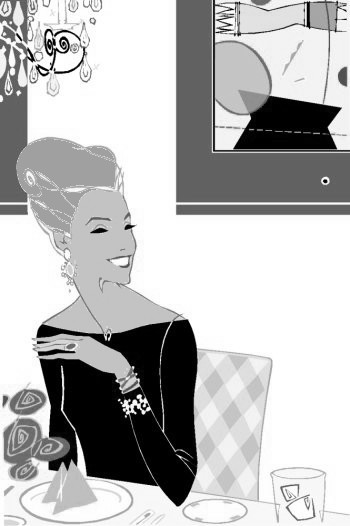 |
Mrs. Ballantyne was
married to Alando Ballantyne,
a physician who researched cancer at Houston's MD Anderson.
Together they raised
a truly remarkable family of seven talented children -
Michael, Dana,
Katina, Marina, Christie, George, and Lisa.
During my time at St.
John's, the Ballantyne family
was the most famous family in the whole
school. There were many talented individuals at St.
John's, but no family could
possibly rival the Ballantynes.
To me, the Ballantyne family was the SJS
answer to the Kennedys.
Having developed my
unusual fascination with their mother, I extended my watch list to
the three Ballantyne children who were closest to me in age.
Dana was two years ahead of me, Katina was in my own grade, and
Marina was one year behind.
Like their mother, Dana,
Katina, and Marina were friendly and warm to everyone. They
were down to earth and thoughtful of
others. Despite their enormous talent, not
one of them displayed any egotism whatsoever. I observed that
Dana, Katina, and Marina achieved tremendous success in
academics, athletics, and leadership.
They all excelled at one school
activity after another. Dana was not only the
football captain, he was far and away the best player on the team.
Marina was Head Prefect
of her class and Katina was a Prefect as well.
It was my observation
that these three students deserved their accolades. In my
opinion, like their mother, the Ballantyne children were born
leaders.
Dana, Katina and Marina received the respect of their peers because they deserved it.
No snobbery, no airs, no pretensions. In nine years, I never
saw a single incident where a Ballantyne child acted in any way
other than exemplary.
Although I had no direct interaction with any of these three
students, from
my close vantage point, I could see they conducted themselves with
extreme dignity. They accomplished extraordinary things and
they did it the right way - they earned it. I am sure they
weren't perfect, but I never saw a single reason to
relinquish my high regard for them.
|
I feel compelled to
state again my
interest in this family was benign.
Watching my three dynamic classmates was something I did because I
admired them. Due to my own feelings of inadequacy, it is no
surprise I was drawn to them as role models. I wanted to know why the Ballantyne children were so
successful. Maybe if I watched, I could learn something.
Meanwhile I respected their privacy just as I
respected the privacy of their mother. Keeping my observations
discrete, I doubt seriously they even realized my interest.
In the end, it all
boiled down to this - I longed for a strong mother like Mrs. Ballantyne.
Through her own actions and the accomplishments of her children, I
developed a great appreciation for the impact a strong mother can
have on a child's life.
|
SUBCHAPTER 23
- KATINA
BALLANTYNE
|
Katina Ballantyne was the
person I watched the most frequently. Since we were in the same
grade, Katina and I shared many classes over the years.
Although
Katina was my classmate, I never knew her on a personal basis. I don't remember a single
incident or one significant conversation with her. On the other hand,
I certainly had enough opportunities to observe her enough to form
strong impressions. Since St. John's
kept its classes small, Katina and I sat in close proximity on many occasions.
Katina conducted herself gracefully at all times.
She was humble and kind almost to a fault with all her
classmates.
Mrs. Ballantyne
was deeply involved
in each
of her children's careers at the school.
After watching the accomplishments of one Ballantyne child after
another, whatever Mrs. Ballantyne did, it worked. Seven children,
seven success stories.
Through the grapevine, I would overhear "Mrs.
Ballantyne" stories about how she made sure her sons and daughters lived
up to her high expectations. I would wryly note that if my own
parents had any expectations for me, they had yet to share them with me.
As I said, due to my fixation with Mrs. Ballantyne, I
studied her
children too. I watched Katina as much as I did her mother.
Due to my respect for Katina, she became the
major reason
why I felt that Mrs. Ballantyne was a superior mother.
Katina definitely brought great honor to her parents.
|
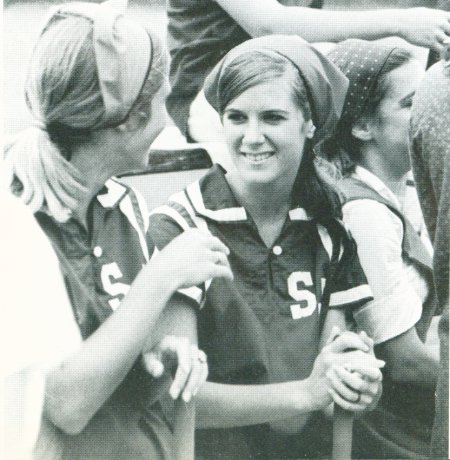 |
I always felt that Katina reflected her mother's talents beautifully.
I had a profound respect for Katina because she conducted herself with so much poise and grace.
Katina was a born leader, the kind of person people would follow
into battle if necessary. A cursory glance at the 1968 yearbook
from my Senior year says it all - Katina was
all-conference in field hockey, she was captain of the
volleyball team, she played lead in The Music Man,
she was a Prefect, she sang in the choir, and she was editor of
the yearbook. Oh, don't let me forget, Katina was an honor student
as well.
Despite
all this success, Katina was level-headed and even-tempered.
I never once saw a streak of meanness or pettiness. There
were no airs of superiority emanating from this young lady.
Indeed, she was always modest and unassuming despite her
continued brilliance.
Katina was not the
exception, but rather the rule. Every single
one of Katina's brothers and sisters were the same way - talented,
generous and humble. They never once abused their popularity to get an edge.
Whatever they accomplished in the classroom and on the playing
fields, in my book they earned it fair and square. Be it the classroom,
the playing field, student politics, or extracurricular activities, the talent
and leadership of the Ballantyne children permeated throughout the
school in seven different grades.
To my surprise, one
day in my Senior year, I overheard Katina speaking about her
mother.
Seniors were treated
very well at my school. Not only were we allowed to hang
out in Quadrangle for everyone to see, we had our very own
Senior Room complete with couches and big comfy chairs. We
could visit the place whenever we had free time.
From this convenient vantage point, I was able to overhear all
the gossip.
Katina was talking
in a low voice to one of her girlfriends, but I was close enough
to hear. Katina said last night her mother had chewed out
one of her brothers for slacking off on his homework in a class
he didn't like. Her brother was trying to explain that
playing football had cut into his study time. Apparently
Mrs. Ballantyne wasn't buying any of it. "What a bunch a bull.
Boo hoo hoo, life isn't fair. I'm sure you deserved that
grade."
As I listened on in
startled fascination, Katina repeated more of the conversation.
"Young man, I don't believe in happy teenagers. I don't
want any excuses. You are going to work harder because I
said so!"
I was in shock.
I thought about that story for days. I had never heard of a
conversation like this before. Mrs. Ballantyne didn't pull
any punches. Obviously the woman was a strong believer in
tough love. My own mother had certainly never
chewed me like this. Considering her sharp tongue, I
decided I never wanted to make Mrs. Ballantyne mad at me.
It doesn't take a
genius to conclude raising seven special children required the
talents of very special
parents. I hope this explains why I admired Katina's mother so
much. I believed it was a great accomplishment to raise so many
gifted, wonderful children.
|
SUBCHAPTER 24
-
INFERIORITY
|
I made a fool of
myself in the 8th grade.
1963 was a
particularly bad year for me. In addition to the grief I
felt over the Kennedy assassination, I made a series of mistakes
that I would come to regret. The pain I felt in the 7th
grade over my apparent relegation to the back of the bus carried
over into the 8th grade. In addition, the presence of Taxi
Driver Neal created constant tension and hostility
in my home.
I ended up making a
series of extremely bad decisions.
In the 8th grade, Mr.
Chidsey cast me in a play as a drunken pirate. I was
having a great time and even received a compliment. Mr.
Chidsey said I
was terrific in the role.
Then one day
my mother said that when the play started in a few weeks, I would have to take
the bus home at night after each performance. I don't even remember what reason
she gave me. Maybe she was working late in those days.
Who knows? What I do remember was how angry I was at her.
I was beyond furious.
No other kid in my entire school had to put up with this crap.
Was I being immature? Yes, absolutely. Yet at the same time, I
was sick and tired of having the rug pulled out from under me.
At the time, we
lived pretty far from school and I didn't know anyone who lived
remotely near us to beg for a ride. All I remember is that
I was so angry at the thought of taking the bus at 10 pm
at night that I decided to quit the play. Poor Mr. Chidsey.
He begged me to stay. He said I would be tough to replace
so late and, besides, I was perfect for the role. Consumed
with guilt, I knew I had done the wrong thing, but I was too
ashamed of myself to change my mind. I hated myself for
days on end for not having the guts to go to him and apologize
and offer to continue the role if it was still open.
And to think Mr.
Chidsey would eventually give me that full scholarship at the end of the year! Oh, how I
must have tried his patience.
I quit the 8th grade
basketball team for the same reason. When I found out some
of the
away games were late at night, my mother gave me the same
line... take the bus home. Considering I didn't know the
bus routes at these different schools, I was worried about
getting lost. In addition, I didn't like the thought of
getting bus transfers downtown and having all those weird
homeless people to contend with late at night. For the
entire basketball season, I seethed with resentment at my
mother. I wanted to play ball!!
I finished second in
the 6th grade spelling bee to Nancy Paxton. Second place
isn't bad at all, so I was encouraged.
The following year,
I cracked down and studied even harder. I literally gave
it everything I had. I finished second in the 7th grade
spelling bee to Nancy Paxton. This time rather than be
happy, I was disgusted. No one can beat Nancy Paxton.
The following year I
was done with losing. I was in a bad mood to begin with
and I was in no mood for any further humiliation. To hell with finishing second to
that damn Nancy Paxton. I skipped the 8th grade spelling
bee altogether.
One day Nancy
stopped me in the hall. "Dick, how did you do in the
spelling bee?"
At first I was angry
at Nancy. I thought she was taunting me. But she
didn't have that look on her face and now I was confused.
I simply muttered, "I wasn't in the spelling bee. I didn't feel like doing it this year."
There was no way in
hell I was going to admit I had quit because I was unwilling to
compete with her any more.
The strangest look
came over Nancy's face. "Oh my goodness, Dick, I didn't know! I
didn't go out for the spelling bee this year because I really
wanted you to win!"
The creepiest set of
feelings overwhelmed me. First, at that moment I hated myself for
disliking Nancy so much. What the hell was wrong with me?
If I didn't know better, Nancy seemed to like me. She was
trying to be nice.
However, I didn't say a word. For one thing, I was
embarrassed. Nancy had surely realized I had quit due to
her superiority. Rather than open myself to more shame,
without a word I
just turned and walked away.
Nancy had made an
effort to reach out to me, but all she saw was a moody boy who
rudely turned his back on her.
Maybe if I could
have swallowed my pride a little, we could have actually been friends. This
bitterness was killing me! No wonder I was so damn
lonely all the time. I was my own worst enemy.
Nancy and I never
shared another conversation.
And what did my mother
say about dropping out of the play? Nothing.
And what did my mother
say about dropping basketball? Nothing.
And what did my mother
say about skipping my third year of spelling bees? Nothing.
So take a guess how
I felt whenever I saw Mrs. Ballantyne in the hallway fussing at
one of her children to do this or do that. I imagined that
Mrs. Ballantyne never missed a single detail. A darkness
would come over me and I would curse my mother for her
passivity.
Now in my mother's
defense, she worked during the day and wasn't able to visit
campus. I understood that.
However, there were no evening conversations either. My mother wasn't the type to encourage. That just
wasn't her style.
I never understood my mother. She
was a really nice person to everyone - I sincerely mean that.
Unlike me, my mother actually had friends. She was a very
warm, outgoing person. However, when it came to me, she had the strangest blind spot.
We just didn't talk about school very much. For whatever
reason, we could not be friends. Don't ask me
why, I don't have an answer.
Without a mother or
a father for support, I had to learn to push
myself. However, there were times when I simply ran out of
courage. Whenever this happened and I did something stupid
like quit, my feelings of shame and
inferiority took over.
I would tell myself,
"Gee, Wouldn't it be great to have
a mother or a father to tell me to get back out there and try again?
Wouldn't it be nice to have someone like Mrs. Ballantyne to
remind me not to give up?"
I don't suppose it will come
as any surprise to reveal that I compared myself to the gifted
Ballantyne children all the time. I wanted to be just like the
Ballantynes.
I wanted to be respected like they were. I
wanted to be admired. I would have traded places with any one of
them in a heartbeat, maybe give the Prince and the Pauper
story an exciting new twist.
Full of sour grapes
and venom, all sorts of dark thoughts would cross my mind.
"Let's see how good those Ballantyne kids would do with my
mother as their mother." All the while the chip on my
shoulder grew larger.
In the nine years I
went to St. John's, it wasn't the cars, the
mansions, or the incredible privilege I saw on a daily basis
that got to me. It was watching people like the Ballantyne children
grow into the finest young adults any parent could ever wish to
have that hurt the worst.
To quote Marlon Brando in his
role from
On the Waterfront, "That could have been me. I
could have been a contender. I could have been somebody."
No wonder I liked that movie so much. That summed up my
feelings perfectly.
As I
tried to make sense of my own lonely childhood, I would have given
anything to be liked and respected like the Ballantynes, my role
models.
I ached to be given the chance
to prove I belonged in the same league as the Ballantyne
children.
I
yearned to show them that I was just as bright, just as athletic, and
just as decent as they were.
Above all else, I
wished to belong and be noticed. I wished to play
alongside the Ballantyne boys on sports teams and I wished to
have someone like Katina become a friend rather than a distant
acquaintance.
But that didn't happen.
|
For a kid with a struggling
mother, no father and no siblings, for a kid who felt like he
had a social disease, watching the superiority of the Ballantyne
clan created an envy that was difficult to bear.
Mind you, these
conclusions were drawn from distant observations. I tell
anecdotes throughout my story, but there will not be any
anecdotes about my interactions with the seven Ballantyne children. Why not?
Am I protecting them?
No, not hardly. The reason there
are no Ballantyne stories is simple enough... there are no
stories! Our paths never crossed. For starters, I did not belong to their social circles. And since I
never participated in
any school activities, there was little reason to interact. I didn't play sports.
I didn't act. Nor did I sing or join
any organizations.
The Ballantyne
children and I simply had no reason to interact.
I imagine I was
just as invisible to the Ballantynes as I was to the
other 220 members of the Upper School.
It isn't easy being a person who has little status in
society. It isn't easy feeling like a competitor given
little chance of winning a fight or contest.
I was
always the outsider looking in.
|
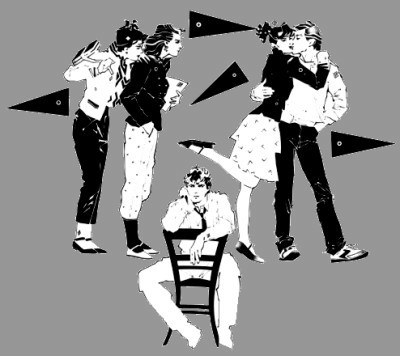 |
SUBCHAPTER 25
-
ACADEMIC GLADIATORS
|
Academics was the only arena
where I could compete. I took my studies seriously.
By coincidence, Katina
was one of my closest
rivals. Given my sad preoccupation with Ballantyne
Superiority, this was the only place where I could show a Ballantyne
that I was an equal. Katina and I were Honor students who traded rank
periodically.
Katina was usually one notch ahead of me or
one notch behind.
Since I was so acutely conscious of protecting
my own academic standing, once we reached high school I never took my eye off her progress.
Katina and I were
members of an entire class of academic gladiators. Like fighting ability in
ancient Sparta, academic performance was worshipped at St. John's.
A major
reason for the school's
exemplary academic record was its skillful use of head-to-head
competition. St. John's students quickly learned to compete or
be weeded out.
In Sparta, the
weakest babies were dumped on the side of the mountain.
There was an interesting parallel at St. John's.
At the start of
every school year, I would note with chagrin that the lowest performing
student from the previous year did not return.
|
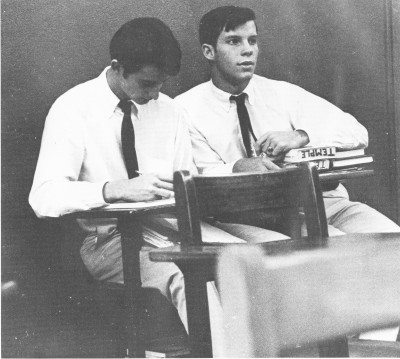 |
The coincidence was too much
to overlook.
Either they were asked to go
or perhaps they quit
to escape the constant embarrassment of being last. Their absence made a
strong impression on me. This was an environment where the
toughest survived and the weakest were culled out and banished to public
school.
I remember one boy named
Jeremy who "disappeared".
I always liked Jeremy.
He was funny and outgoing. Since his mother taught ballet at SJS, I had a hunch he probably
received a
scholarship like me. There was a rumor that children
of the faculty were given scholarships of varying degrees.
I had long noted Jeremy had something
of the same hangdog air about him as me. I assumed Jeremy occupied the
next rung on the social ladder just above me. Neither of us had a lick
of confidence around our Alpha classmates. However, while I was an Honor student, Jeremy
really struggled. I could not help but wonder
if his low grades had something to do with his disappearance.
One
afternoon I saw Jeremy back at school as he waited for his mother to finish a dance class. I
went over and asked him where he had gotten to. Jeremy smiled ruefully
and said he had transferred to Lamar High School, a public school right
next door to St. John's. I asked him how he was doing. Jeremy
swelled with pride and said he was one of the best students in his class.
I was surprised.
Jeremy was the best in his class? I was so lost in my own problems
that I never considered the idea that Jeremy could conceivably be smart.
In my limited teenage awareness, if someone was last in my class, then that
meant they were
stupid.
So how could someone who was
stupid suddenly become smart? Something was definitely wrong with
my logic.
I scrutinized Jeremy carefully.
This wasn't bluster. There seemed to be a new confidence about him
that made his surprising tale of worst to first ring true.
After chatting a while, we
parted. I began to process this interesting new information.
The worst student at St. John's leaves and becomes one of the best
students at Lamar.
That is when I realized I
was oblivious to the concept of relativity. Relative to SJS
students, Jeremy struggled. Relative to Lamar students, Jeremy
excelled.
I developed a new respect for Jeremy.
Previously I had thought he was maybe average smart at best. However,
now that Jeremy explained how he excelled in the general
population, I realized for the first time
Jeremy
was a pretty smart guy in his own right.
Now my thoughts
turned to St. John's. If Jeremy was
smart, then what did that say about my own classmates? In a flash, I
developed a new appreciation for the intelligence of my
classmates. If Jeremy was among the smartest kids at Lamar, then
every one of my classmates must be brilliant in his or
her own way.
In a sense, we were being trained as gladiators.
We were all sparring partners. Using our minds and our willpower, we fought on a daily basis to be the
best and to improve our
academic standing. The tough competition brought out the best in
us.
|
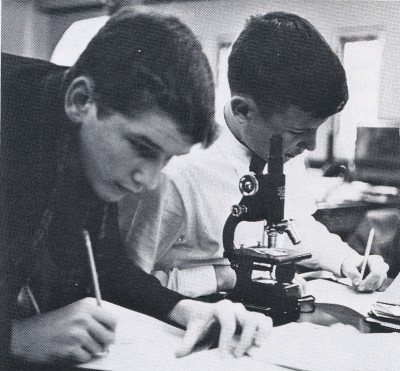 |
My competition with Katina
was never acknowledged between the two of us. We did not talk to each other past an occasional formality.
To be honest, it was hardly a head to head struggle. I doubt
Katina even cared what my grades were. She made excellent grades
and knew that her admission to a good college was a foregone conclusion.
As the gifted daughter of a successful doctor, I assumed concern about college
finances never crossed her mind. I on the other hand thought
about college scholarships constantly.
Therefore I doubt
seriously Katina kept check on my progress the way I kept check on
hers. As for me, I watched her grades
like a hawk.
Since college was my obvious escape route from home, my
desperation to succeed led me to take my class ranking far too
seriously for my own good. Consequently
once we reached high school I
began to keep tabs on
Katina's grades. When test results
were handed out, I made sure to take a peek at Katina's score.
One might conclude I was
obsessed with Katina. No, not at all. Yes, I watched her
from afar, but I left her alone. I liked Katina. Katina never said a single mean
thing to me. My overriding impression of Katina was that she was
very classy. Ultimately my fixation on Katina had little to do
with her, but rather my preoccupation with her family's Olympic standing in my mind.
It was simply that every
time I saw Katina in class, she would say or do something that reminded
me of her continued excellence. Over time, Katina came to represent everything that I wanted
to be, but could never be.
I envied Katina because I believed I had ability
equal to hers and I hated feeling like an underdog because she had so many advantages.
•
Katina had a
dynamic, caring mother. I had a mother who was
a lost soul.
•
Katina had a father. I had a picture of a
father hanging in my room.
•
Katina had a family. I had no one.
•
Katina
had friends. I had a few acquaintances.
•
Katina had brothers and
sisters to motivate her and study with at night. I had no one.
•
Katina had a support system to cheer her up if she had a bad day. I
had my dog and my basketball.
Most of all, I
envied Katina because the sight of her reminded me that she had a great mother
and I didn't.
If I had a Magic Mother like
Mrs. Ballantyne, I would have a parent committed to guiding my fortunes.
I would have a mother to encourage me when I was down and chew me out
when it was time to quit feeling sorry for myself. I would have someone to explain my fears to and
someone to clear up my confusion about all sorts of things that troubled
me.
|
But this was just a dream.
My fantasy would disappear the moment I came home to my own hapless mother who
was putting on makeup as she prepared to hit the bars. No heart to
heart conversations for us. My mother's energy tonight was reserved for man
hunting over at the Athens Bar and Grill.
Who would be the lucky guy tonight?
No doubt I would meet him in the morning. After a brief
introduction to mother's latest Greek hero, I would
ride my bike to St.
John's. When I saw Mrs. Ballantyne, I would resume my dream about
what it would be like to have a mother like her.
Interestingly enough,
for all the
years I studied Mrs. Ballantyne, I never spoke to her at the
school. Not once in
nine years did our paths intersect in halls of St. John's.
Watching the woman from afar, I would stare and wonder about how
my life would have been different if I had her for a mother.
What kind
of things could I accomplish if I could have someone like
her in my corner?
I resented bitterly the uneven playing field.
Darn it, I believed I had just as much talent as the Ballantyne
kids and every other kid at St. John's. Academically, I
proved my value, but unfortunately the classroom was the only
place where I stood my ground. In the sports
arena, student activities and the
social arena, I was a total loser.
I didn't have a clue how
to engage in friendly banter. Rather than tease with
my classmates and develop skills like small talk and the ability to
inquire about their private thoughts, I held back.
It upset me no end to
see how much my social awkwardness, my feelings of being
inferior, and my lack of
confidence held me back.
WHAT IF? How
would my life change IF I could just have a mother like Mrs. Ballantyne?
I drove myself crazy
with the thought that having a better parent would make a
difference.
|
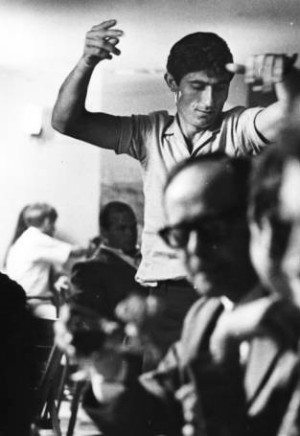
A Greek sailor dancing at
the Athens Bar and Grill
|
Yes, these were the dark thoughts and sad fantasies of a lonely,
introverted, troubled boy wrapped inside his thick shell of self-pity.
Envy, pity, and loneliness
are a dangerous combination. I was becoming a very bitter kid.
Although I was the underdog at St. John's
to some degree in the early years, it was the 8th grade when I
really began to lose confidence
in myself. Due to my problems at home, I hit a real tailspin
and quit one thing after another. I came to believe I wasn't as good as these other
students... I wasn't attractive, I wasn't witty, I wasn't polished,
and, most of all, I wasn't interesting.
I was someone very
easy to ignore.
Strangely enough, the
spelling bee
incident with
Nancy Paxton upset me enough to take some action.
When Nancy stopped me in
the hall to ask about the spelling bee results, I sensed that she
was reaching out to me. However I had no idea how to react
appropriately. I just mumbled a few words and walked away to
find some rock to crawl under.
Now I was consumed with
a serious round of self-loathing. My life boiled down to me,
myself, and I. No wonder I had few friends... I was so preoccupied
with my own misery I was not the most cheerful kid to be around.
The funny thing is, I
tried my best to rally. Okay, so I didn't have a mother.
Poor me. But I didn't want to spend the rest of my life
feeling sorry for myself. I made a firm decision to right my
mistakes. I knew I was wrong to give up on basketball, a sport
I excelled in. I decided starting that afternoon, I would
practice shooting basketball at a nearby park one hour a day after
school.
I had a plan.
Next year I would be a
freshman in high school. Not only would I make the freshman
basketball team, I was determined to be a star. Then maybe I
would get enough confidence to talk to girls instead of shying away
from them. It was time to be somebody.
That afternoon, Terry
and I made a trip over to Cherryhurst Park. Today I would
begin my basketball
project.
|
|